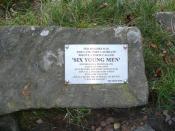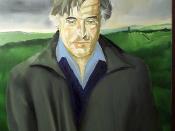Compare how poets present ideas about conflict from different perspectives in Hawk Roosting and Futility
In Hawk Roosting, the voice believes that it has the ability and right to decide whether other animals should live or die, saying 'I kill where I please because it is all mine'. In this poem there is a sense of pride, in that the voice is proud of its power. The voice of the poem could represent different things: a sniper used in war, or a self-obsessed, arrogant dictator. The voice believes that it is the most important thing in the world 'It took the whole of creation to produce my foot, my each feather'. The poem is written with lots of strong images 'My flight is direct through the bones of the living', showing that the hawk kills but does not show any remorse for it. This poem could be a metaphor for a political leader or people in general.
Ted Hughes presents the hawk as powerful and destructive, and possibly deluded 'My manners are tearing off heads'. The hawk is also merciless 'My manners are tearing off heads'. The poet uses self-centred language such as first person pronouns, which emphasise how important the hawk thinks it is, and how it believes that it controls all conflict. The poet uses repetition 'hooked head and hooked feet' to highlight the hawk's feeling of power and control. The hawk believes that its weapons, the hooks, are the most important part of it. The hawk does not take into account other animals as he believes all he needs to do is fulfil his needs. The poem describes violence in a natural setting, which could be a metaphor for human violence.
The poem 'Futility' is about an injured soldier set in France in the First World War.


